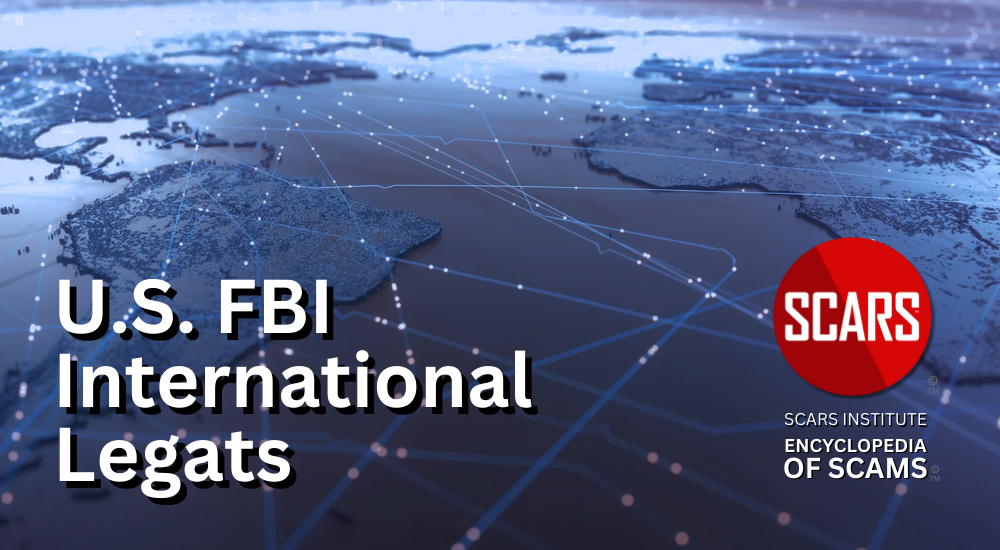
SCARS Institute’s Encyclopedia of Scams™ Published Continuously for 25 Years

Steam Video Game Platform Scams
Steam Video Game Platform Players Beware – Scams are Everywhere on the Steam Platform
Catalog of Scams – A SCARS Institute Insight
Authors:
• SCARS Institute Encyclopedia of Scams Editorial Team – Society of Citizens Against Relationship Scams Inc.
• Portions from Steam
Article Abstract
Steam scams come in various forms, targeting users through phishing, impersonation, fraudulent trades, and gift card scams. Scammers exploit the value of Steam accounts, tricking users into handing over login credentials, money, or valuable in-game items. Some scams involve fake giveaways, blackmail, or PayPal chargebacks, while others use malware disguised as gaming tools.
Red flags include messages from low-level accounts, coercive language, and requests for communication outside Steam. To protect yourself, avoid suspicious links, enable two-factor authentication (2FA), and conduct all trades on Steam’s official platform. Victims should report scammers using Steam’s built-in reporting tools to help remove fraudulent accounts and protect the community.

Steam Video Game Platform Players Beware – Scams are Everywhere on the Steam Platform
How Steam Game Platform Scams Operate
Steam scams manifest in various forms, all are designed to deceive users into sending money, transferring valuable in-game items, or surrendering their account credentials. Steam accounts, especially those with large game libraries and rare items, can hold significant value, making them attractive targets for scammers.
Common scams often involve impersonation, fraudulent trades, or phishing attempts aimed at tricking users. Scammers may pose as Valve (Steam’s parent company) employees, requesting sensitive information, or they may lure victims into fake trades that result in financial loss or item theft. Despite the wide range of scams, there are recognizable warning signs to help users avoid falling victim, which we will cover in more detail below.
Types of Steam Scams
Steam Gift Card Scams
Gift card scams involve scammers tricking users into purchasing Steam gift cards and providing the card codes directly. These scams typically unfold in two ways:
-
-
- Impersonation and Blackmail: Scammers impersonate trusted individuals or organizations and claim that you owe money. They demand payment in the form of Steam gift cards, instructing you to purchase the cards and send the codes as “payment.”
- Fake Giveaways or Prizes: Fraudsters contact users claiming they’ve won a prize but must first send a Steam gift card to “verify” their identity. Once the scammer receives the code, they redeem the card, and the victim never receives the promised reward.
- Romance Scams or Phone Scams: These typically involve someone that the victim ‘knows’ that needs money and asks for it in the form of Steam Gift Cards – these are then sold and converted into money or bitcoin by the scammers.
-
Scammers prefer gift cards because they are difficult to trace, easy to redeem, and provide no buyer protection, making recovery of funds nearly impossible.
Phishing Scams
Phishing scams are designed to steal your login credentials by directing you to fake websites mimicking Steam’s interface. Scammers often send links through direct messages or comments, urging you to log in to claim rewards or prevent account suspension. Entering your details on these fake sites hands them over to the scammer, potentially giving them full access to your account.
Impersonation Scams
In these scams, fraudsters impersonate Valve employees or Steam support personnel. They may contact you with alarming messages, claiming your account is at risk of suspension unless you provide personal information or items. By exploiting fear, scammers coerce users into complying, often resulting in the loss of valuable account assets.
PayPal Scams
PayPal scams involve fake transactions or fraudulent chargebacks. A scammer may send an invoice claiming payment is required for a rare in-game item. After you pay, the item is never delivered. Alternatively, they may “pay” you via PayPal, receive the item in trade, and then reverse the transaction, leaving you without the item or funds.
Steam API Scam
This scam involves gaining access to your Steam credentials, often through phishing or weak passwords. Scammers manipulate your trade offers by using bots that intercept and replace legitimate trades with fraudulent ones. This method allows scammers to acquire your items without offering anything in return.
Steam Malware Scams
Scammers lure users into downloading third-party tools, cheats, or “free gift card” generators that promise to enhance gaming experiences. Many of these downloads secretly contain malware that can compromise your account and steal personal data.
Item-Switching Scam
Although less common due to Steam’s updated security features, item-switching scams still occur. In this scheme, the scammer initiates a trade with a valuable item but switches it for a lower-value item just before finalizing. Users who don’t carefully review the trade may unknowingly accept an unfavorable deal.
Warning Signs of Steam Scams
Suspicious Messages from Low-Level or New Accounts: Scammers frequently use newly created or low-level accounts that lack game history or reputation. Be wary of unsolicited messages, especially those involving trades or requests for sensitive information.
Threatening or Coercive Language: Fraudsters often use intimidation tactics, threatening to suspend or delete your account if immediate action isn’t taken. Valve will never contact users with threats or demand personal information.
External Communication and Payment Requests: Scammers may ask you to communicate or conduct transactions outside of Steam’s platform to bypass Steam’s security measures. Avoid using third-party messaging apps or payment platforms for trades.
How to Protect Yourself from Steam Scams
Be Cautious in Communication: Approach messages from unknown users with skepticism, especially those involving trades or offers that seem too good to be true.
Verify Accounts: Check the profile and trade history of users who initiate contact. Look for signs of legitimacy, such as account age, game ownership, and trading reputation.
Trade Only on Steam: Conduct all trades and item exchanges within Steam’s official platform to ensure transactions are secure. Avoid external trading websites.
Avoid Clicking Suspicious Links: Do not click links sent in comments or direct messages unless you can verify their authenticity.
Enable Steam Guard and 2FA (Two Factor Authentication): Use Steam’s two-factor authentication (2FA) and Steam Guard to add extra layers of protection to your account.
Be Wary of Gift Card Requests: No legitimate business, individual, or Valve employee will ever ask for Steam gift card codes as payment. Treat any such request as a scam.
Reporting Steam Platform Scams
If you encounter or fall victim to a scam, report the user through Steam’s built-in reporting system. Additionally, report fraudulent activity on any external platform or payment service the scammer attempted to use. Taking action helps Valve identify and remove malicious accounts, protecting others in the process.
According to Steam:
How to Report a Scammer, Hijacker or Phisher
Reporting a scammer, hijacker or phisher through their Steam Profile will always be better than submitting a Steam Support ticket containing your report. A community report includes the best information about the interaction between your accounts, and is quicker to review and act on.
Reporting a friend’s hijacked account can also be useful for Steam’s moderators to lock that account until its owner can recover it.
To avoid scams in the future, ensure that you know the methods that a malicious user may use to attempt to scam. You can find detailed information in the Steam Scam FAQ.
NOTE:
Steam moderators do not take action or issue restrictions unless the reported infraction can be verified against the reported account’s actual use.
Some scammers may attempt to threaten your account with mass or automated reporting. Steam disregards all automated or malicious reports and will lock any accounts involved. You can be sure your account is safe from any attempt to weaponize reports unless you’re using your account in a way that violates Steam’s rules.
Some scammers may claim they’ve mistakenly or falsely reported you and you need to take action to save your account. This is a scam and can be ignored: Scam – I Have Been Reported and Will Be Banned
If you are scammed:
If you are scammed, phished, hijacked, or wish to report another account as hijacked, please use the Report feature built into Steam:
- Go to the Steam profile of the offending user
- Click the ‘…’ drop-down button located at the top right of the page
- Choose “Report Player”
- Select the category of offense which best describes the behavior you are reporting.
- Select the violation.
- Write a short statement about your interaction with this user, and hit “Submit Report”. Note: You can also choose to block this user.
If you have been scammed, we recommend that you review Steam’s Scam FAQ, the Recommended Trading Practices article and the Steam Item Restoration Policy for more information.
For information on how to safeguard an account, please read the Steam Account Security Recommendations and Steam Account Phishing articles.
If you have lost items due to your account being compromised, please see the Steam Item Restoration Policy article for more information.
Report Steam Gift Card Scams
To report Steam gift card abuse online, navigate to the profile of the offending user on Steam, click the three dots in the top right corner, select “Report Player,” and choose the appropriate violation category to submit your report; this is the best way to report a scammer through Steam’s built-in reporting feature.
Key steps:
-
- Go to the user’s profile: Access the Steam profile of the person you suspect of abusing gift cards.
- Click the drop-down menu: Find the three dots or drop-down menu in the top right corner of the profile.
- Select “Report Player”: Choose the option to report the player from the menu.
- Choose the violation: Select the category that best describes the abusive behavior related to the gift card.
- Submit the report: Follow the prompts to submit your report with details about the incident.
Important points to remember:
Keep evidence: If possible, gather evidence like screenshots or chat logs to support your report.
Contact Steam Support: If you have trouble reporting through the in-platform feature, you can also reach out to Steam Support directly.
Report to authorities: If you believe the abuse is part of a larger scam, consider contacting your local law enforcement or the Federal Trade Commission (FTC). See reporting.AgaisntScams.org to find how and where to report.
-/ 30 /-
What do you think about this?
Please share your thoughts in a comment below!
Table of Contents
- Steam Video Game Platform Players Beware – Scams are Everywhere on the Steam Platform
- Article Abstract
- Steam Video Game Platform Players Beware – Scams are Everywhere on the Steam Platform
- How Steam Game Platform Scams Operate
- Types of Steam Scams
- Warning Signs of Steam Scams
- How to Protect Yourself from Steam Scams
- Reporting Steam Platform Scams
- Report Steam Gift Card Scams
LEAVE A COMMENT?
Recent Comments
On Other Articles
- Arwyn Lautenschlager on Love Bombing And How Romance Scam Victims Are Forced To Feel: “I was love bombed to the point that I would do just about anything for the scammer(s). I was told…” Feb 11, 14:24
- on Dani Daniels (Kira Lee Orsag): Another Scammer’s Favorite: “You provide a valuable service! I wish more people knew about it!” Feb 10, 15:05
- on Danielle Delaunay/Danielle Genevieve – Stolen Identity/Stolen Photos – Impersonation Victim UPDATED 2024: “We highly recommend that you simply turn away form the scam and scammers, and focus on the development of a…” Feb 4, 19:47
- on The Art Of Deception: The Fundamental Principals Of Successful Deceptions – 2024: “I experienced many of the deceptive tactics that romance scammers use. I was told various stories of hardship and why…” Feb 4, 15:27
- on Danielle Delaunay/Danielle Genevieve – Stolen Identity/Stolen Photos – Impersonation Victim UPDATED 2024: “Yes, I’m in that exact situation also. “Danielle” has seriously scammed me for 3 years now. “She” (he) doesn’t know…” Feb 4, 14:58
- on An Essay on Justice and Money Recovery – 2026: “you are so right I accidentally clicked on online justice I signed an agreement for 12k upfront but cd only…” Feb 3, 08:16
- on The SCARS Institute Top 50 Celebrity Impersonation Scams – 2025: “Quora has had visits from scammers pretending to be Keanu Reeves and Paul McCartney in 2025 and 2026.” Jan 27, 17:45
- on Scam Victims Should Limit Their Exposure To Scam News & Scammer Photos: “I used to look at scammers photos all the time; however, I don’t feel the need to do it anymore.…” Jan 26, 23:19
- on After A Scam, No One Can Tell You How You Will React: “This article was very informative, my scams happened 5 years ago; however, l do remember several of those emotions and/or…” Jan 23, 17:17
- on Situational Awareness and How Trauma Makes Scam Victims Less Safe – 2024: “I need to be more observant and I am practicing situational awareness. I’m saving this article to remind me of…” Jan 21, 22:55
ARTICLE META
Important Information for New Scam Victims
- Please visit www.ScamVictimsSupport.org – a SCARS Website for New Scam Victims & Sextortion Victims
- Enroll in FREE SCARS Scam Survivor’s School now at www.SCARSeducation.org
- Please visit www.ScamPsychology.org – to more fully understand the psychological concepts involved in scams and scam victim recovery
If you are looking for local trauma counselors please visit counseling.AgainstScams.org or join SCARS for our counseling/therapy benefit: membership.AgainstScams.org
If you need to speak with someone now, you can dial 988 or find phone numbers for crisis hotlines all around the world here: www.opencounseling.com/suicide-hotlines
A Note About Labeling!
We often use the term ‘scam victim’ in our articles, but this is a convenience to help those searching for information in search engines like Google. It is just a convenience and has no deeper meaning. If you have come through such an experience, YOU are a Survivor! It was not your fault. You are not alone! Axios!
A Question of Trust
At the SCARS Institute, we invite you to do your own research on the topics we speak about and publish, Our team investigates the subject being discussed, especially when it comes to understanding the scam victims-survivors experience. You can do Google searches but in many cases, you will have to wade through scientific papers and studies. However, remember that biases and perspectives matter and influence the outcome. Regardless, we encourage you to explore these topics as thoroughly as you can for your own awareness.
Statement About Victim Blaming
SCARS Institute articles examine different aspects of the scam victim experience, as well as those who may have been secondary victims. This work focuses on understanding victimization through the science of victimology, including common psychological and behavioral responses. The purpose is to help victims and survivors understand why these crimes occurred, reduce shame and self-blame, strengthen recovery programs and victim opportunities, and lower the risk of future victimization.
At times, these discussions may sound uncomfortable, overwhelming, or may be mistaken for blame. They are not. Scam victims are never blamed. Our goal is to explain the mechanisms of deception and the human responses that scammers exploit, and the processes that occur after the scam ends, so victims can better understand what happened to them and why it felt convincing at the time, and what the path looks like going forward.
Articles that address the psychology, neurology, physiology, and other characteristics of scams and the victim experience recognize that all people share cognitive and emotional traits that can be manipulated under the right conditions. These characteristics are not flaws. They are normal human functions that criminals deliberately exploit. Victims typically have little awareness of these mechanisms while a scam is unfolding and a very limited ability to control them. Awareness often comes only after the harm has occurred.
By explaining these processes, these articles help victims make sense of their experiences, understand common post-scam reactions, and identify ways to protect themselves moving forward. This knowledge supports recovery by replacing confusion and self-blame with clarity, context, and self-compassion.
Additional educational material on these topics is available at ScamPsychology.org – ScamsNOW.com and other SCARS Institute websites.
Psychology Disclaimer:
All articles about psychology and the human brain on this website are for information & education only
The information provided in this article is intended for educational and self-help purposes only and should not be construed as a substitute for professional therapy or counseling.
While any self-help techniques outlined herein may be beneficial for scam victims seeking to recover from their experience and move towards recovery, it is important to consult with a qualified mental health professional before initiating any course of action. Each individual’s experience and needs are unique, and what works for one person may not be suitable for another.
Additionally, any approach may not be appropriate for individuals with certain pre-existing mental health conditions or trauma histories. It is advisable to seek guidance from a licensed therapist or counselor who can provide personalized support, guidance, and treatment tailored to your specific needs.
If you are experiencing significant distress or emotional difficulties related to a scam or other traumatic event, please consult your doctor or mental health provider for appropriate care and support.
Also read our SCARS Institute Statement about Professional Care for Scam Victims – click here to go to our ScamsNOW.com website.
















Thank you for your comment. You may receive an email to follow up. We never share your data with marketers.